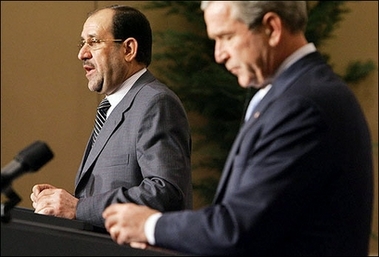Bush: No 'graceful exit' from Iraq
(AFP)Updated: 2006-12-01 07:48
WASHINGTON - US President George W. Bush, set to rule in weeks on a possible course change in Iraq, warned against expecting him to lay out plans for "a graceful exit" from the war-torn country.
A heavyweight panel led by former US secretary of state James Baker and ex-representative and foreign policy expert Lee Hamilton has wrapped up its review of US policy in Iraq and is expected to give Bush its advice December 6.
The Pentagon has been conducting its own review, and the White House has also commissioned a sweeping government-wide reassessment of US policy in Iraq, amid soaring sectarian violence and fears of all-out civil war.
"There's a lot of speculation that these reports in Washington mean there's going to be some kind of graceful exit out of Iraq. We're going to stay in Iraq to get the job done, so long as the government wants us there," said Bush.
"This business about 'graceful exit' just simply has no realism to it at all. We're going to help this government," said the US president, under heavy pressure at home to overhaul his strategy in the nearly four-year old war.
The bipartisan Baker-Hamilton commission -- created by the US Congress and officially known as the Iraq Study Group -- will call on Bush in its report to order a measured withdrawal of US forces from Iraq, US media said.
The New York Times reported that the panel agreed to recommend withdrawing 15 US combat brigades in Iraq -- the bulk of the US fighting presence -- but leaving 70,000 or more American trainers, logistics experts and members of a rapid reaction force. The recommendations are not binding.
The United States currently provides the vast majority of the 160,000-strong multinational force in Iraq.
The group did not say where the troops would go, and did not present a withdrawal timetable, which Bush has opposed. But it made clear that the US military commitment should not be open-ended.
Asked when Bush would reach a decision on implementing the advice, US national security adviser Stephen Hadley told reporters: "It's going to be weeks rather than months" but offered no further details.
"I look forward to hearing their recommendations. I want to hear all advice before I make my decisions about adjustments to our strategy and tactics in Iraq to help this government succeed," Bush said in Jordan.
At the same time, Maliki told ABC television that Iraqi forces will be ready to take charge of security in the country in June 2007.
"I can say that Iraqi forces will be ready, fully ready to receive this command and to command its own forces, and I can tell you that by next June our forces will be ready," Maliki said, speaking through a translator.
Bush and Maliki also ruled out partitioning Iraq.
And Bush , wounded by November 7 elections in which his Republicans lost control of the US Congress to opposition Democrats, has also signaled resistance to another likely piece of advice: direct talks with Syria and Iran.
Asked about Iraq's relations with Iran, Maliki said he wanted "good relationships" with his country's neighbors, as long as they showed "respect of the Iraqi borders and the internal affairs of Iraq."
Bush refused to say whether he would consider direct talks but stressed: "I appreciate the prime minister's views that the Iraqis are plenty capable of running their own business and they don't need foreign interference from neighbors that will be destabilizing the country."
Separately, former US president Bill Clinton, interviewed privately by the Iraq Study Group, told CNN television that "some redeployment" was necessary but warned that setting a withdrawal timetable will reduce US leverage on neighboring countries and on Iraqi leaders to help quell the violence.
|
||
|
||
|
|

